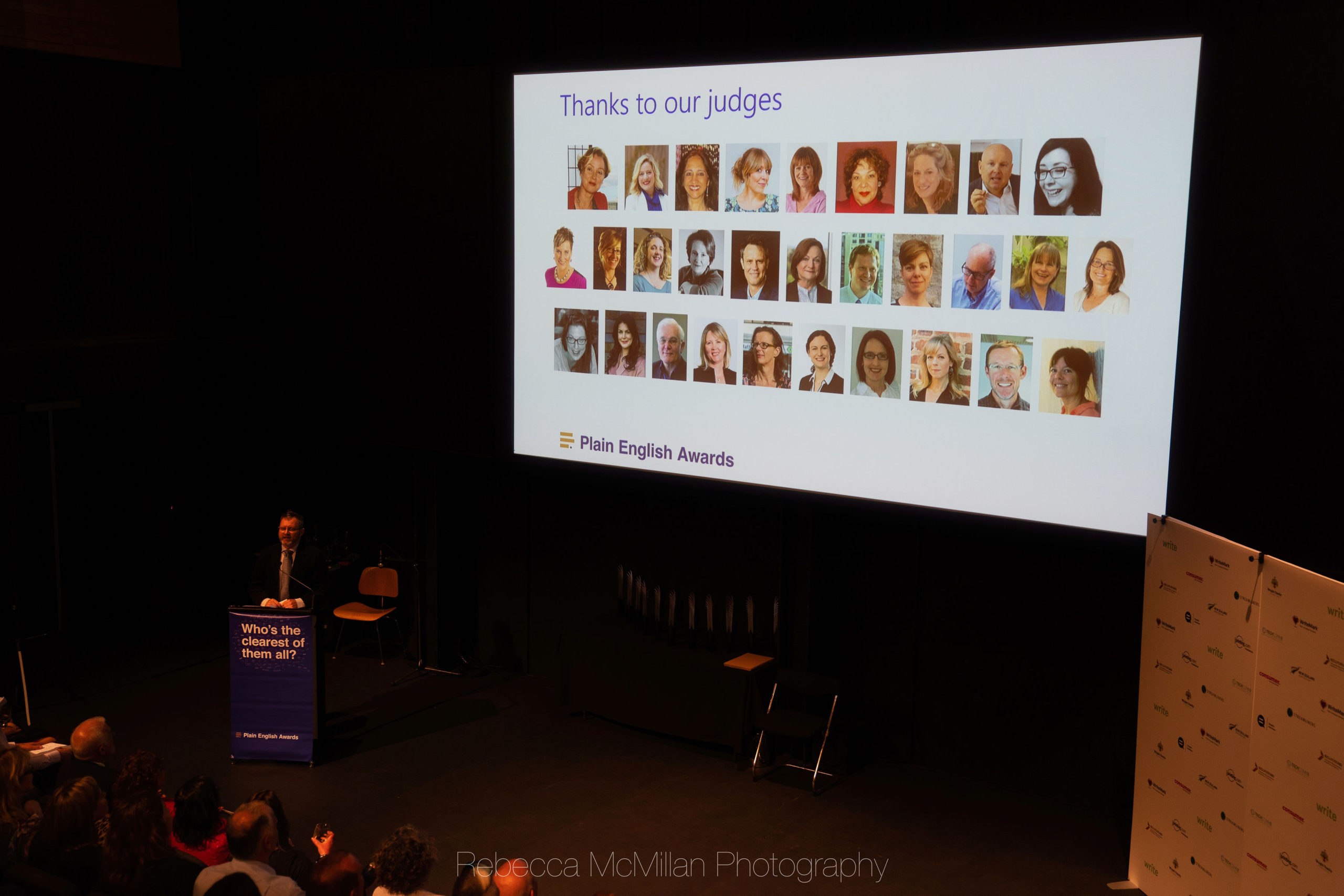
It’s time to celebrate! | Photo by Erwan Hesry on Unsplash
With preparations for our cyber-ceremony in full swing, you can now register your place to attend.
Register for the 2021 Plain English Awards ceremony
What you can look forward to at this year’s event
This year, for the first time, we’re running our celebrations online. While we’ll miss celebrating with people in person, our aim is to make this year’s event super special in its own way.
Our MC James Elliott is bound to delight
Now in his fifth year as MC of the Awards, lawyer and comedian James Elliott is a firm highlight at our ceremonies. James is back this year and guaranteed to entertain.
Find out more about James
Bring your supporters along — we can host more people online
With no limits to seat numbers, we’d love you to invite as many of your supporters to join you at the ceremony as possible. In the past, we’ve often had to limit spaces to 150 people — but that’s not a problem this year!
Our overseas entrants and supporters can easily join us
We’ve always extended an invitation to our ceremony to both our domestic and international supporters. However, often the overseas contingent isn’t able to make it. Happily (and time differences aside), that’s not a problem this year either!
We opened up entries to Australia for the first time this year
Read about our international panel of judges
Celebrate International Plain Language Week at the same time
Our Awards ceremony is right in the middle of International Plain Language Week. This gives you a readymade way to get involved in an international event that celebrates clarity.
So, don’t hang about — register your place at the 2021 Plain English Awards ceremony
Thanks again to our sponsors for their commitment to the (plain language) cause
We have an incredible line-up of sponsors this year. We’d like to thank them all for their support.
Read about this year’s sponsors
Melissa Wardell September 30th, 2021
Posted In: 2021 Awards ceremony, 2021 Plain English Awards, Australian clear communication awards, Awards ceremony, Communications, Finalists, Judges, People's Choice awards, Plain English Awards
Tags: 2021 Plain English Awards, Best Plain English Communication, clear communication, Finalists, judges, People's Choice, sponsors, winners

Thanking our judges at an Awards ceremony | Photo by Rebecca McMillan Photography
We asked our judges for some insider advice and tips to pass on to people considering entering the Awards.
And as usual, they were more than happy to help out!
We asked our judges:
- what aspects of an entry makes them think ‘this one is a winner’
- what their top piece of advice was for someone entering the Awards
- what common missteps they see that quickly let them know an entry won’t be a finalist
- what they thought were the most notable features of winning entries from past Awards.
This type of entry is a winner
One judge liked entries that surprised them and surpassed their expectations.
Others said, ‘First impressions are crucial. For me, if the structure is helpful and logical, the language simple and clear, and the tone friendly and engaging, then the authors will definitely be in the running to be winners’.
‘The language will be the equivalent of plain speaking — ordinary, everyday language throughout the text. The document will do the job the writer describes to us.’
‘I think for me that’s when I can feel that the writer has put the effort in to realise that they are writing for a reader. It might not be perfect, but you can tell that they are thinking about the receiver of the message.’
‘It’s how the authors weigh and balance the various aspects and elements of the communication — the audience and its needs, the situation and its urgency or characteristics, the political charge of the situation and people’s reaction, and how all of that has an impact on the message, tone, word choice, sentence construction, images — and when they tell me that they have talked to the intended audience, instead of just assuming they got it right. When all of these things are cohesive, I know I have a winner.’
‘Simplicity and clear evidence of designing the information for the audience.’
Our judges’ top pieces of advice
Our judges want entrants to put themselves in their readers’ shoes. They want you to forget about yourself and your message. Just ‘focus on your readers’, one said, and we agree. Your audience is, after all, what really matters.
Always put yourself in your readers’ shoes. You wouldn’t want to wade through dense, long-winded, jargon-filled reports. Neither do your readers!
Another common theme from our judges was:
Keep it simple!
Here are some other top tips from our judges.
- Don’t get in your own way.
- Leave your ego at the door.
- Brevity is the currency of good comms.
- Think outside of the box, talk to talk to your customers, ask them what they want and need, get to know them. And … surprise yourself!
- Avoid bureaucratic language, particularly impersonal, passive, or pompous sentences.
- Keep it short, sweet, and simple! (No one wants to read lots on a screen.)
- Make a human connection. Show that your piece reaches its audience and has results. Show that every decision was carefully made based on evidence, not assumptions. And even better, try to show documented results — fewer phone calls, more returned surveys, bills paid sooner.
Common missteps judges see in entries
Here’s more on what to avoid, with some examples from the judges of missteps in entries that didn’t make the grade.
Lack of focus on the intended reader
- Too much focus on their own story
- Using their company name over and over again, instead of using ‘us’ and ‘you’
- Text that suggested that the writer wanted the message or the organisation to seem important
Unclear purpose
- A lack of attention to the purpose of the entry. ‘With no ‘care’, probably no need to share…’
- Failing to talk about the goal of your piece in terms of what you want your audience to be able to do with the information
Language-related problems
- Using unfamiliar words in place of everyday words that most people will easily understand
- Too many words, repetition
- Vague language, jargon, or management clichés
Lack of testing or evaluation
- Not being able to show that you tested your piece with your intended audience, no matter how limited the testing
- Not being able to show how you used feedback to improve the document or website
Stronger editing or design needed
- Clumsiness in the writing
- Too much text and not enough white space
- Not being able to explain why you made a choice about design or word choice based on your intended audience.
- Overwriting — including information that just dilutes the purpose of the document — and a lack of tailoring
The most notable feature of past winning entries was putting the reader first
Judges all agreed that putting the reader first was the way to a winning entry. ‘Clarity and consideration of the audience’, said one judge.
Winning documents were thoughtfully and helpfully laid out, using clear and simple language, and in an engaging tone that inspired trust.
‘They all really moved into the heads of their readers’, one judge said. ‘What questions do they have? How can we answer those questions as clearly as possible? How can design help us? What tone of voice is needed?’
‘We have been unanimous in selecting entries that showed unusual skill, such as explaining bowel cancer with sensitivity and clarity. Others have explained complex topics in everyday language.’
‘I’ve only judged the Best Plain English Sentence Transformation before … ‘short and active’ were the two main ingredients!’
‘One of the most memorable entries I judged several years ago was a newsletter updating residents about a major road closure that was going to last several months. The details were highly technical; the inconvenience was very high for anyone who used the road. But the newsletter used similes and metaphors to explain the technical aspects; for example, ‘We need to remove the equivalent of two soccer arenas of rock’. The writer used humour and truth and, as a result, built the trust of those who read it. It could have been a boring weekly update, but instead was an engaging read in terms that even a non-engineer — who didn’t live anywhere near there — could understand. That was understanding the audience and the situation and creating something more.’
‘A conversational tone. And good design (white space, colour, graphics, and so on).’
Some extra wisdom from our judges
Our judges wanted entrants to enjoy the process. ‘The standard has been rising over time’, one said. ‘Even to be chosen as a finalist is impressive and should go in your CV. The ability to write in plain English is in demand around the world.’
Another judge added, ‘It’s a great way to get valuable personal feedback on your writing! And you support plain language for everyone, no matter what someone’s abilities or background are. A great cause.’
‘No matter the outcome for your entry this year, read the comments of the judges with interest. For the most part, they will give you insights on how to approach about your next communication in a richer way.’
‘Plain English is not an add-on to good business writing — it is good business writing.’
Read Trophy Tips: Top tips from past winners
Find out more about this year’s judges
Watch videos by some of our judges in our gallery
Nicola Welby July 5th, 2021
Posted In: 2021 Plain English Awards, Communications, Judges, Plain English Awards, Trophy Tips
Tags: clear communication, clear thinking, clear writing, Finalists, improved writing, insights, plain English, Trophy Tips Seminar, winners

Will you join our prestigious list of winners? | Photo of 2018 Award winners by Rebecca McMillan Photography
We asked past Award winners what appealed to them about entering the Plain English Awards, what advice or feedback they got from the judges, and what tips they’d give to anyone entering this year.
We hope you find these tips useful!
We asked our winners:
- why entering the Awards appealed to them
- what features of their entry the judges appreciated the most
- what they would do differently if they entered the 2021 Awards
- what their top piece of advice was for this year’s entrants.
Why entering the Awards appealed to our past winners
- ‘We knew what we were doing was important and wanted to share that with other people who care about plain English.’ (Plain English Champion winner)
- ‘I met someone years before who’d entered and won an award, so for me it was a development goal to work towards. I wanted to become good enough, consistent enough and confident enough in what I do to deserve one of these awards. I also wanted to connect with people in similar roles to me and support and celebrate their achievements too.’ (Plain English Champion, Best Plain English Sentence Transformation winner)
- ‘I believe plain English is so important in society and I wanted to be a part of making change. I loved the challenge of making a technical document plain!’ (Best Plain English Document — private sector winner)
- ‘I think good technical communication deserves to be celebrated, and I love a challenge! Plus I thought that if I won, the award would look good on my desk and in my CV.’ (Best Plain English Technical Communicator winner)
The judges appreciated easy-to-read letters with a personal tone and clear design
The judges appreciated documents that were well structured and elegantly designed. They appreciated that a team effort often plays a part in improving communication. The judges also felt enthusiasm for plain English coming across in personal tone and were impressed by the entrants’ dedication to using both plain English and smart design to make their organisation’s communications clearer.
Judges also liked seeing great layout, and technical language explained clearly.
One winner said that the most powerful thing they did was include quotes from people on a benefit. ‘We had people thanking us for sending them easy to read and kind letters.’
Our winners said they could always find room for improvement
One said, ‘I’d take everything I’ve learnt since I last entered, and talk about that — the challenges, the new thinking, the lessons learned, the new responsibilities, and the successes.’
‘I would include more about the difference it made to people’, said another.
One entrant entered an instruction manual that was designed for the web, including drop-boxes that opened on click. As this was not a public-facing website, the entrant had to provide the content in Word, which wasn’t ideal. They said that in future they’d choose examples that they could provide in a more accessible format.
Our winners shared their top pieces of advice for someone entering the Awards
- ‘You have to really care about your entry and what you worked on.’
- ‘Structure your supporting evidence well, to make the value you’ve added to plain communication really clear and convincing for the judges.’
- ‘Design is as important as the plain English words used. Your layout is an integral part of plain English, as are any design features used.’
- ‘It sounds obvious, but make sure you read “What you need to know” for the category, and make sure you provide judges with everything they are looking for.’
Some more words of wisdom from our winners
Our winners agreed that ‘plain English is underrated, yet crucially important’. They also felt it was fantastic to be part of the plain English movement.
A plain English document can win your business customers, save readers valuable time, improve your organisation’s credibility, and even save lives.
The Awards recognise that it’s not always easy to keep things simple — our project was really daunting — but it’s so important.
The Awards have a really fantastic celebratory vibe. Even if you don’t win, it’s a great achievement to be a finalist and support other finalists, and to be part of an important movement in New Zealand.
Thanks to all our past winners for their valuable advice! We hope all our entrants get as much out of entering the Awards process as valuable as our past winners have!
Read Trophy Tips: In the words of our judges
Read about past award winners
How to enter the 2021 Plain English Awards
Nicola Welby July 5th, 2021
Posted In: 2021 Plain English Awards, Plain English Awards, Trophy Tips
Tags: clear communication, clear thinking, clear writing, Finalists, improved writing, insights, judges, plain English, Trophy Tips Seminar, winners

Have you heard the news? Our judges have chosen their finalists. Image by Rakicevic Nenad. Pexels license.
They said it wasn’t an easy task. However, after running over their shortlisted entries with a fine-tooth comb, our judges have settled on this year’s finalists.
Who are our Best finalists?
The following nominations are finalists in our People’s Choice — Best Plain English Communication category:
Who are our Brainstrain finalists?
The following nominations are finalists in our People’s Choice — Worst Brainstrain category:
- Auckland City Council — Proposed Plan Change letter
- Christchurch City Council — Te Wai Ora o Tāne Draft Integrated Water Strategy
- Rabo Capital Securities Limited — Redemption Notice letter
What happens next
Our judges in each category will now review their selected entries and decide on a winner. Our media partner, Newsroom, will announce this year’s winners on their website on Thursday, 28 November.
Anne-Marie Chisnall October 18th, 2019
Posted In: 2019 People's Choice Awards, Brainstrain, Finalists, Industry awards
Tags: Best Plain English Communication, Finalists, People's Choice 2019, Worst Brainstrain

So often we hear stories about the people behind a plain English initiative in an organisation. To make sure these people get their own time to shine, we’ve got a Champion award — for the Best Individual or Team.
These sometimes unsung heroes are those who’ve worked hard to make plain English a reality in their organisation.
Are you a plain English hero in your organisation? Here are a few signs that you need to enter for Best Individual or Team — of course, we know you’ll be able to think of many more!
You’ve talked to your leaders about the need for a plain English project
You’re the one who went to the management or board meeting and talked about all the good reasons for starting a plain English project (large or small).
Or maybe your team got the project started, and took proof of the benefits to management to advocate for wider adoption of plain English throughout the organisation.
If you’re a plain English leader, we recommend you enter and get industry-wide recognition.
You’ve trained your colleagues in plain English
Not content to be the only plain English writer in your team or business, you’ve created a programme of training. You’re spreading the word about the advantages of plain English and giving your colleagues tools and techniques to help them write more clearly.
Perhaps you make sure you include a slot at team meetings on plain English tips — and that slot has become the highlight of the meetings.
Or are you the go-to person or team that is consulted before a major report goes out or content is loaded on the website?
If you’ve become indispensable as guide or mentor for people who want to write clearly, it’s time to get that entry in.
You’ve produced resources to support clear writing
You’ve compiled all you know into a resource for your organisation — a writing how-to, or brand guidance on clear writing. You’ve created intranet resources and newsletter articles to help build a culture of clear communication.
Or perhaps you decided those terrible templates had to go. You’ve restructured, rewritten, and rebuilt templates to make standard communications easier to produce — and easier for the target audience to receive and understand.
Sometimes this background work needs to be brought to the fore — enter the Champion category and let your light shine!
Read about last year’s winner
Find out if your organisation is a contender for the Best Organisation category
Enter the Awards
Anne-Marie Chisnall August 27th, 2018
Posted In: 2018 Plain English Awards
Tags: 2018 Plain English Awards, Best Individual or Team, Champion, Finalists, Industry awards, recognition, winners

Last year's Plain English Champion — Best Organisation winners Hannah Morgan-Stone, left, William Meldrum, second from right, and Jerome Chapman, from Utilities Disputes, with Write CEO Lynda Harris. Photo by A Beautiful Photo.
We’re grateful this year to once again have the support of TechCommNZ, who’s sponsoring our Best Plain English Technical Communicator category. As part of their sponsorship, TechCommNZ recently published an article we wrote for them about our Trophy Tips Seminar. With their blessing, here’s that same article for your reading pleasure.
Winning an award is the best way to have your work recognised — or your team’s. And for business or technical writers, or people working in communications, the annual Plain English Awards are as good as it gets.
Tips for success from those in the know
In the build-up to the opening of this year’s Plain English Awards, we held a Trophy Tips Seminar in Wellington last month. We also broadcast this seminar through Facebook Live.
Before the seminar, we surveyed former winners and judges of the Awards to gather some tips for aspiring winners. While responses varied slightly, their main messages were clear and simple.
Best advice for aspiring winners
In short, the people we surveyed said that winning entries demonstrated similar traits.
- Short sentences
- Crystal-clear headings
- Readers’ needs prioritised
Common mistakes to avoid
To ensure your entry gets through the first phase of judging, survey respondents recommended that entrants avoid some common pitfalls.
- Unclear headings
- Long-windedness
- Excessive wordiness
- Poorly organised content
For more tips on how to submit a winning entry in the 2018 Plain English Awards, view our Trophy Tips Seminar.
Get in touch if you have any questions
You’re welcome to ask questions at any time: enquiries@plainlanguageawards.org.nz. We’re here to help! See more about the Awards on our website.
Melissa Wardell June 21st, 2018
Posted In: 2018 Plain English Awards, Plain English Awards, Trophy Tips Seminar
Tags: 2018 Plain English Awards, clear communication, Finalists

From shortlists to finalists — decisions have been tough. Photo by Gaelle Marcel on Unsplash
After some tough deliberations from our judges, here are the finalists in the 2017 Plain English Awards.
As with our shortlists, entries are in no particular order. We haven’t published finalists in some categories so we don’t let the cat out of the bag.
‘Ooh — awesome’
Read some of the feedback we’ve had from judges about this year’s finalists below.
- ‘All three judges found this to be the very best group of entries we have seen in our many years judging these awards.’
- ‘We applaud the effort everyone has made to follow the principles of plain writing.’
- ‘You can be especially proud to win this category among these excellent entries!’
- ‘The friendly, light tone in this rewrite is a delight.’
- ‘When I finished the rewrite I said aloud “Ooh – awesome”.’
- ‘Overall this is an excellent effort.’
Winners will be announced on 23 November
We’ll announce our winners at the Awards ceremony in Wellington on 23 November. We’ll also publish the list of winners on our website later that evening.
Nicola Welby October 20th, 2017
Posted In: Awards brand, Communications, Finalists, Plain English Awards
Tags: clear communication, Finalists, Plain English Awards, plain language








